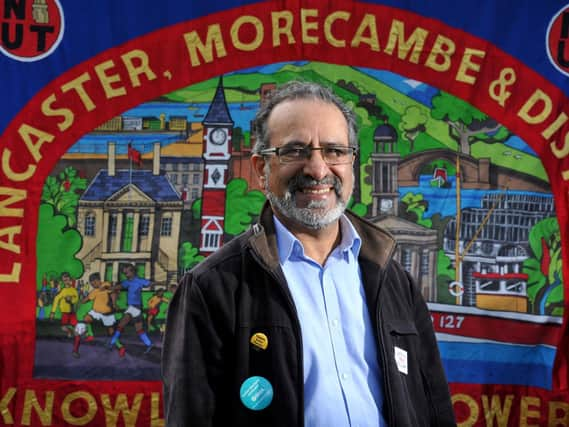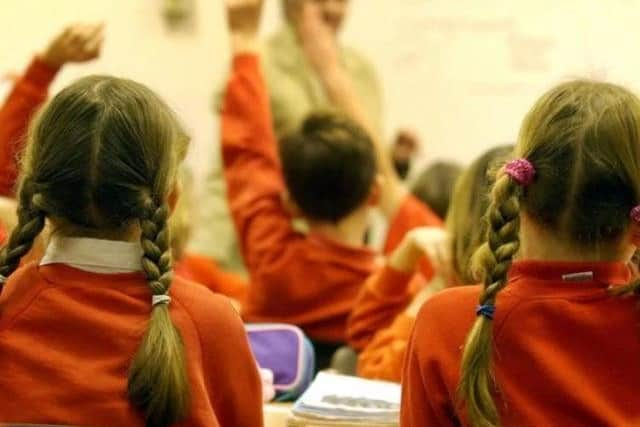Lancaster and Morecambe education union expresses concern at 'reckless' government roadmap plans for schools


In Monday afternoon's announcement, Prime Minister Boris Johnson said that schools and colleges would re-open to all year groups on March 8.
In addition, the roadmap states that by May 17, indoor hospitality could resume, along with other accommodation such as hotels, organised indoor sport, a maximum of 30 people gathering outdoors - including private gardens - and two households indoors.
Advertisement
Hide AdAdvertisement
Hide AdBy June 21, life would be pretty much back to normal under the plan.


But Sam Ud-din, Lancaster & Morecambe’s National Education Union District Secretary, has expressed his concerns about the plans in place for the education system.
He urged the government to 'follow the data, not the dates' and said workers in the sectors expected to reopen first are being 'sacrificed' by not being vaccinated.
He said: “We are all committed to bringing all children and young people back into the classroom as soon as possible.
Advertisement
Hide AdAdvertisement
Hide Ad"However, it is counterproductive – reckless - if there is a danger of causing yet another surge in the virus, and the potential for a further period of lockdown. Wider opening must be safe and sustainable.
"We therefore urged over the weekend the Prime Minister to commit to 8 March ONLY if the scientific evidence is absolutely clear that this is safe, and at that point go no further than a phased return of children and young people with sufficient time to assess the impact before moving to the next phase.
"Yet we were given no data targets – how many new cases per week, how many deaths per day this week should we get down to - only a set of dates for opening a series of aspects of society – firstly education on 8th March, three weeks later outdoor sports, two weeks later most retail and hospitality, and so on.
"At the same time this is NOT the order that vaccinations are going be done in; that stays strictly by age and medical condition – so in effect the workers in each of these occupational groups are being sacrificed, one at a time.
Advertisement
Hide AdAdvertisement
Hide Ad"New variants are still arising, not yet properly assessed and new symptoms are being seen, not yet fully acknowledged by the authorities. Locally, the number of cases in schools in Lancashire went up, week-on-week, all the way through January.
"That is why this is a reckless course of action. Our members do still fear for their lives, and the lives of their families. It could also trigger another spike in Covid infections, prolong the disruption of education, and risk throwing away the hard-won progress made in suppressing the virus over the course of the latest lockdown.
"The government’s own SAGE group have said so, in the documents released AFTER the prime minister spoke on Monday. In their 78th meeting two weeks ago they stated: “An initial limited and cautious reopening of schools (e.g. primary schools only) for a time limited period, in the absence of easing other restrictions, might allow for an assessment of the impact on community transmission.” The government has chosen to ignore this cautious data-driven approach.
"The science around the role that schools play in the overall rate of transmission is uncertain. Scientists have expressed different views on this point. Will masking in all secondary schools be enough?
Advertisement
Hide AdAdvertisement
Hide Ad"It’s not been done before, so again we are experimenting and putting people’s lives at risk without any hard data to justify such a move. What we do know is that the full reopening of schools will bring nearly 10 million pupils and staff into circulation in England – close to one fifth of the population. This is not a small easing of lockdown restrictions. It is a massive step."
Mr Ud-din said a more cautious approach, such as that being taken in Scotland, Wales and Northern Ireland, would be welcomed.
"The impact of further opening – remember all schools are open taking higher numbers of vulnerable and key-worker children than ever before AND helping children to learn from home – vaccination and expanded testing/tracing/isolation procedures (the new pupil tests have yet to be proven to work effectively) - necessitate a cautious approach with wider school and college opening phased over a period of time," he said.
"This is the approach being taken in Scotland, Wales and Northern Ireland. It allows public health experts to assess the impact of the first phase BEFORE moving to the next.
"We must follow the data, not the dates.”